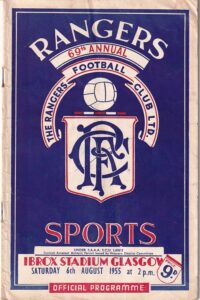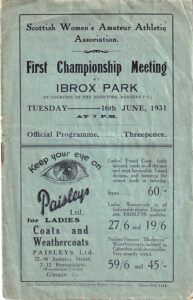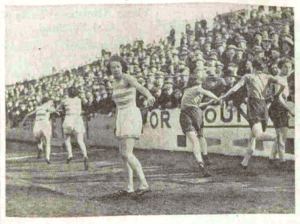TRACK AND (FOOTBALL) FIELD
Article written in June 2020

Above: Hampden Stadium during the Glasgow 2014 Commonwealth Games
There has always been a close connection between athletics and football. Many football clubs were built with a track round the pitch which enabled the hosting of athletics events.
Clubs took advantage of this and at one time would attract large crowds to athletics events with a five-a-side football tournament as the accompaniment.
The SAAA (Scottish Amateur Athletic Assocation) utilised football grounds for the national championships with the three major Glasgow venues – Hampden Park, Ibrox Park and Celtic Park – being used frequently. Hampden Park was the most popular venue, used to host the championships on 31 occasions between 1887 and 1951. Indeed, from 1929 to 1951 it was the sole venue for the championships.
When the SWAAA (Scottish Women’s Amateur Athletic Association) first held their national women’s championship in 1931, the venue was Ibrox Park, which was used regularly by the SWAAA for the championships on Friday evenings in the 1930s.
Going back in time to the 19th Century, when football was developing and a proper league structure had not yet been put in place, many clubs held athletic sports meetings. This was common in Glasgow where the leading clubs such as Rangers, Celtic, Queen’s Park and Third Lanark hosted annual sports, but such meetings could be found across the country – Kilmarnock, Hearts, Arbroath and St Mirren to name just a few.
The first open athletics club in Scotland was Clydesdale Harriers, founded in 1885, and from its beginnings, many members took part in other sports but the connection with Rangers was strong and several men were founder members of both clubs. Clydesdale trained at the Rangers facilities at Kinning Park and then Ibrox, and their annual sports were held there, attracting many of the leading British athletes of the time.
Rangers and Celtic, the dominant clubs in Scotland, put on major sports meetings. The Celtic sports meeting was first held in 1892 and that initial event was reported to have attracted a crowd of
15,000. The event continued annually until it petered out just before the Second World War, the last meeting being held in 1938.
However, the Rangers Sports were undoubtedly the biggest events to be held at a football ground. Rangers early link with Clydesdale Harriers cemented an interest in athletics. The football club held their first annual sports on 20 August 1881 and they were held up until 1962. The sports attracted international athletes of high calibre to them. In 1931, the great Finnish athlete Paavo Nurmi competed in the 2 Miles and 4 Miles races, breaking the Scottish all-comers’ record held for many years by Alf Shrubb by three seconds with his run of 19:20.4.
This was just one of seventy all-comers’ records set during the course of the Rangers Sports and at the time of the last Sports in 1962, 20 of the listed all-comers’ records had been set at the event, including such names as Lindy Remigino (100 yards), the Jamaican Herb McKenley (220), India’s Milkha Singh (440), and Derek Ibbotson of England who held the 1, 2 and 3 miles records.
As an illustration of the quality, the 1952 Sports saw 5 Olympic champions compete and all broke British or Scottish all-comers’ records. Remigino beat McDonald Bailey to win the 100 yards, USA’s Walt Davis bettered the high jump record, Jamaica’s George Rhoden broke the 440 yards record and then teamed up with Herb McKenley and Arthur Wint (both Olympic relay gold medallists) in the Jamaican quartet that won the medley relay. McKenley had already beaten the British record for 220 yards. All cheered on by a 50,000 crowd who also watched Hearts beat Hibs in the five-a-side football.
Athletics was common as entertainment for the crowds – this photograph is a woman’s relay race from Aberdeen’s Pittodrie Park as early as 1933.
In 1965, Ming Campbell, a future President of Scottish Athletics, set a Scottish record of 7.5 seconds for 75 yards at half time during the St Mirren v Rangers match at Love Street, Paisley, beating Ron Marshall and Les Piggot. Before the match, Crawford Fairbrother had cleared 6 feet 9 inches in the high jump, just ½ inch short of the Scottish record. His last attempt at 6ft. 10in. was close enough to bring from the crowd the sort of response they reserved for a full-blooded shot against the crossbar.
In November 1975, a crowd of over 55000 for the Celtic v Rangers match watched Peter Hoffmann beating Paul Forbes in an invitation 500 metres race at Celtic Park, with England’s Alan Pascoe coming in last place of the six runners. Scotland v England international matches often had invitation races put on to entertain the crowds.
In the 1980s, Angela Bridgeman and Sandra Whittaker ran at Celtic Park to get them used to running in front of a big crowd as preparation for the Olympics. As Sandra recalls: “it was supposed to be a jog around during half time to get used to a large crowd – never ran as fast in our lives, wasn’t a competition, we were dressed in our red, white and blue GB tracksuits. Went down really well!”
The changes in football grounds, with most now closer to the pitch and the full track circuit not available has seen the demise of athletics events at football grounds. However, in 2014, Hampden Park was resurrected as an athletics stadium to host the Commonwealth Games. The re-vamped stadium played host to the Scottish Schools Championships, the Glasgow Grand Prix and the Commonwealth Games.
27 of the current Scottish all-comers’ records were set that year at Hampden Park, 8 Scottish native records and one national record. Athletes from around the world, from United States and Canada, Jamaica, Grenada and Puerto Rico, Ethiopia, Kenya and Nigeria, all now grace the Scottish record lists.
It may be the last time a football ground is used for the purpose but, if so, what a fitting end to the relationship that athletics and football have had.
 SATS Scottish Athletics Track Statisticians
SATS Scottish Athletics Track Statisticians


